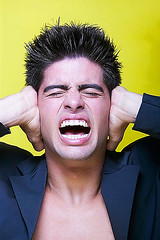Coping With Pulsatile Tinnitus One Ear
Dealing with pulsatile tinnitus one ear every day may be
difficult. Pulsatile tinnitus one ear is a very personal condition. You are the
only person hearing those loud, obnoxious noises and feeling those inner ear
vibrations. Many others have gone through the difficulties of living with pulsatile
tinnitus one ear. This article will provide you with strategies that can help
you manage your pulsatile tinnitus one ear.
Pulsatile tinnitus one ear affects many children as well as
adults. Usually this is caused by a sinus or ear infection. First of all, make
certain that your child gets the medical treatments that are applicable to
these afflictions. After that, explain to children why they are hearing the
noises and assure them that the noises will disappear along with the
infections.
If you are a pulsatile tinnitus one ear sufferer, it is
advisable to either reduce your sodium intake drastically, or try to cut it out
of your diet entirely. Too much dietary salt can restrict the blood flow to
ears, causing your pulsatile tinnitus one ear to become even worse. Stay away
from both table salt and certain high-sodium foods, including canned food and
processed snacks like chips. Check the labels on your groceries to see if they
have a lot of sodium.
People with pulsatile tinnitus one ear should stay away from
loud noises. Keep earplugs close by, in your purse or glove-box, so you can use
them anytime you need protection from unexpected noise exposure. If you don't
have earplugs, cover your ears with your hands or use your fingers! If you are
exposed to a noise emergency, plug your ears with your fingers.
If you play a musical instrument, it can help you forget
about pulsatile tinnitus one ear and end it as soon as you can. Only certain
types of instruments, like brass and woodwind, are really good at canceling out
the noise, and the reason that they are is because they are closer to the head
and the noise ends up reverberating in your skull.
Learning from experience is a good way to help your pulsatile
tinnitus one ear. Find some books, read blogs, subscribe to podcasts and post
on forums to learn from others. You may be able to help fellow pulsatile
tinnitus one ear sufferers with details of any treatments that have improved
your pulsatile tinnitus one ear.
There is scientific data suggesting that pulsatile tinnitus
one ear may be linked to inflammation. It will make sense to eat a diet full of
things that contain anti-inflammatory foods. The foods you should incorporate
in this diet include lots of vegetables and fruits, along with flax seed oil
and salmon.
If pulsatile tinnitus one ear is keeping you from dozing
off, try to picture yourself reclining in a wheat field. Imagine that the sound
you experience is the rustling of wheat waving in the breeze, and picture
clouds and birds passing by in the sky. Admire nature all around you by
floating in the sky and flying around. This should provide you with some great
dream time.
Only give yourself 15 minutes to try and fall asleep. If you
have trouble falling asleep after that time, leave your bedroom to do something
else instead. Do not engage in any activity that might be stressful or overly
stimulating. Instead, try to find something that will help relax you. Use your
bed only for sleeping in order to help prevent your mind from associating it with
work, or other activities that can prevent you from falling asleep.
Living with pulsatile tinnitus one ear is easier if you
enlist support from loved ones. Tell your family and friends about your health
condition, and express to them how pulsatile tinnitus one ear is affecting your
life. For example, compare your condition to having to hear a horrible sound,
like a phone ringing. Doing this should help you feel less alone, and hopefully
make your close ones more understanding.
One way to fight pulsatile tinnitus one ear is to stop
thinking negative thoughts. While perusing an article about the downfalls of
different pulsatile tinnitus one ear symptoms, it was quickly realized that
this negativity is what prevented the author from getting help with his
symptoms. Give each treatment option enough time to be effective and just keep
in mind that you are trying your best with the information at hand.
These tips are tried-and-true for helping pulsatile tinnitus
one ear sufferers. Many people suffer from this problem. There are ways to
treat it as well as ways that have been carefully examined by other sufferers.
These methods will have hopefully helped you figure out what issues you have.



